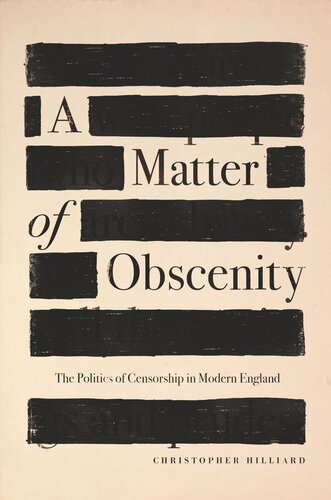

Most ebook files are in PDF format, so you can easily read them using various software such as Foxit Reader or directly on the Google Chrome browser.
Some ebook files are released by publishers in other formats such as .awz, .mobi, .epub, .fb2, etc. You may need to install specific software to read these formats on mobile/PC, such as Calibre.
Please read the tutorial at this link: https://ebookbell.com/faq
We offer FREE conversion to the popular formats you request; however, this may take some time. Therefore, right after payment, please email us, and we will try to provide the service as quickly as possible.
For some exceptional file formats or broken links (if any), please refrain from opening any disputes. Instead, email us first, and we will try to assist within a maximum of 6 hours.
EbookBell Team

5.0
100 reviewsA comprehensive history of censorship in modern Britain
For Victorian lawmakers and judges, the question of whether a book should be allowed to circulate freely depended on whether it was sold to readers whose mental and moral capacities were in doubt, by which they meant the increasingly literate and enfranchised working classes. The law stayed this way even as society evolved. In 1960, the prosecutor asked the jury in the obscenity trial over D. H. Lawrence's Lady Chatterley's Lover, "Is it a book that you would even wish your wife or your servants to read?" Christopher Hilliard traces the history of British censorship from the Victorians to Margaret Thatcher, exposing the tensions between obscenity law and a changing British society.
Hilliard goes behind the scenes of major obscenity trials and uncovers the routines of everyday censorship, shedding new light on the British reception of literary modernism and popular entertainments such as the cinema and American-style pulp fiction and comic books. He reveals the thinking of lawyers and the police, authors and publishers, and politicians and ordinary citizens as they wrestled with questions of freedom and morality. He describes how supporters and opponents of censorship alike tried to remake the law as they reckoned with changes in sexuality and culture that began in the 1960s.
Based on extensive archival research, this incisive and multifaceted book reveals how the issue of censorship challenged British society to confront issues ranging from mass literacy and democratization to feminism, gay rights, and multiculturalism.